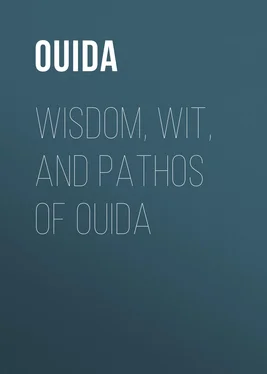Ouida - Wisdom, Wit, and Pathos of Ouida
Здесь есть возможность читать онлайн «Ouida - Wisdom, Wit, and Pathos of Ouida» — ознакомительный отрывок электронной книги совершенно бесплатно, а после прочтения отрывка купить полную версию. В некоторых случаях можно слушать аудио, скачать через торрент в формате fb2 и присутствует краткое содержание. Жанр: foreign_prose, literature_19, foreign_antique, на английском языке. Описание произведения, (предисловие) а так же отзывы посетителей доступны на портале библиотеки ЛибКат.
- Название:Wisdom, Wit, and Pathos of Ouida
- Автор:
- Жанр:
- Год:неизвестен
- ISBN:нет данных
- Рейтинг книги:4 / 5. Голосов: 1
-
Избранное:Добавить в избранное
- Отзывы:
-
Ваша оценка:
- 80
- 1
- 2
- 3
- 4
- 5
Wisdom, Wit, and Pathos of Ouida: краткое содержание, описание и аннотация
Предлагаем к чтению аннотацию, описание, краткое содержание или предисловие (зависит от того, что написал сам автор книги «Wisdom, Wit, and Pathos of Ouida»). Если вы не нашли необходимую информацию о книге — напишите в комментариях, мы постараемся отыскать её.
Wisdom, Wit, and Pathos of Ouida — читать онлайн ознакомительный отрывок
Ниже представлен текст книги, разбитый по страницам. Система сохранения места последней прочитанной страницы, позволяет с удобством читать онлайн бесплатно книгу «Wisdom, Wit, and Pathos of Ouida», без необходимости каждый раз заново искать на чём Вы остановились. Поставьте закладку, и сможете в любой момент перейти на страницу, на которой закончили чтение.
Интервал:
Закладка:
"You come from the Roman Emperors?"
"The Roman Emperors?" she repeated. "When the name was a travesty, an ignominy, a reproach! When Barbarians thronged the Forum, and the representative of Galilee fishermen claimed power in the Capitol? Yes; I descend, they say, from the Commneni; but I am far prouder that, on the other hand, I come from pure Athenians. I belong to two buried worlds. But the stone throne of the Areopagus was greater than the gold one of Manuel."
"That animal life is to be envied perhaps," she said.
"Their pride is centred in a silver hairpin; their conscience is committed to a priest; their credulity is contented with tradition; their days are all the same, from the rising of one sun to another; they do not love, they do not hate; they are like the ass that they drive, follow one patient routine, and only take care for their food. Perhaps they are to be envied!"
"You would not lose 'those thoughts that wander through eternity,' to gain in exchange the peace from ignorance of the peasant or the dullard?"
She turned her face to him, with its most beautiful smile on her lips and in her eyes.
"No, I would not: you are right. Better to know the secrets of the gods, even though with pain, than to lead the dull, brute life, though painless. It is only in our dark hours that we would sell our souls for a dreamless ease."
"Dark hours! You should not know them. Ah, if you would but trust me with some confidence! if there were but some way in which I could serve you!"
Her eyes met his with gratitude, even while she gave him a gesture of silence. She thought how little could the bold, straight stroke of this man's frank chivalry cut through the innumerable and intricate chains that entangled her own life. The knightly Excalibur could do nothing to sever the filmy but insoluble meshes of secret intrigues.
"It is a saint's-day: I had forgotten it," she said to turn his words from herself, while the bell of the campanile still swung through the air. "I am a pagan, you see: I do not fancy that you care much for creeds yourself."
"Creeds? I wish there were no such word. It has only been a rallying-cry for war, an excuse for the bigot to burn his neighbour."
"No. Long ago, under the Andes, Nezahualcoytl held the same faith that Socrates had vainly taught in the Agora; and Zengis Khan knew the truth of theism like Plato; yet the world has never generally learnt it. It is the religion of nature—of reason. But the faith is too simple and too sublime for the multitude. The mass of minds needs a religion of mythics, legend, symbolism, and fear. What is impalpable escapes it; and it must give an outward and visible shape to its belief, as it gives in its art a human form to its deity. Come, since we agree in our creed, I will take you to my temple—a temple not made by hands."
"I never had a fair field!"—it may be sometimes a coward's apology; but it is many a time the epitome of a great, cramped, tortured, wasted life, which strove like a caged eagle to get free, and never could beat down the bars of the den that circumstances and prejudice had forged. The world sees the few who do reach freedom, and, watching their bold upright flight, says rashly, "will can work all things." But they who perish by the thousand, the fettered eagles who never see the sun; who pant in darkness, and wear their breasts bare beating on the iron that will never yield; who know their strength, yet cannot break their prison; who feel their wings, yet never can soar up to meet the sweet wild western winds of liberty; who lie at last beaten, and hopeless, and blind, with only strength enough to long for death to come and quench all sense and thought in its annihilation,—who thinks of them—who counts them?
The earliest dawn had broken eastward, where the mountains stretched—the dawn of a southern summer, that almost touches the sunset of the past night—but under the dense shadows of the old woods that had sheltered the mystic rites of Gnostics and echoed with the Latin hymns to Pan, no light wandered. There was only a dim silvery haze that seemed to float over the whiteness of the tall-stemmed arum lilies and the foam-bells of the water that here and there glimmered under the rank vegetation, where it had broken from its hidden channels up to air and space. Not a sound disturbed the intense stillness; that the night waned and the world wakened, brought no change to the solitudes that men had forgotten, and only memories of dead-deserted gods still haunted in the places of their lost temples, whose columns were now the sea-pines' stems, and on whose fallen altars and whose shattered sculptures the lizard made her shelter and the wind-sown grasses seeded and took root. Of the once graceful marble beauty and the incense-steeped stones of sacrifice nothing remained but moss-grown shapeless fragments, buried beneath a pall of leaves by twice a thousand autumns. Yet the ancient sanctity still rested on the nameless, pathless woods; the breath of an earlier time, of a younger season of the earth, seemed to lie yet upon the untroubled forest ways; the whisper of the unseen waters had a dream-like, unreal cadence; in the deep shade, in the warm fragrance and the heavy gloom, there was a voluptuous yet mournful charm—the world seemed so far, the stars shone so near; there were the sweetness of rest and the oblivion of passion.
Death is not ours to deal. And were it ours, should we give him the nameless mystic mercy which all men live to crave—give it as the chastisement of crime? Death! It is rest to the aged, it is oblivion to the atheist, it is immortality to the poet! It is a vast, dim, exhaustless pity to all the world. And would you summon it as your hardest cruelty to sin?
They were silent; she stirred their souls—she had not bound their passions.
"A traitor merits death," they muttered.
"Merits it! Not so. The martyr, the liberator, the seeker of truth, may deserve its peace; how has the traitor won them? You deem yourselves just; your justice errs. If you would give him justice, make him live. Live to know fear lest every wind among the leaves may whisper of his secret; live to feel the look of a young child's eyes a shame to him; live to envy every peasant whose bread has not been bought with tainted coin; live to hear ever in his path the stealing step of haunting retribution; live to see his brethren pass by him as a thing accurst; live to listen in his age to white-haired men, who once had been his comrades, tell to the youth about them the unforgotten story of his shame. Make him live thus if you would have justice."
They answered nothing; a shudder ran through them as they heard.
"And—if you have as I—a deliverance that forbids you even so much harshness, still let him live, and bury his transgression in your hearts. Say to him as I say, 'Your sin was great, go forth and sin no more.'"
"One is not an assassin!"
"Since when have you discovered that?"
The flush grew darker on Count Conrad's forehead; he moved restlessly under the irony, and drank down a draught of red fiery Roussillon without tasting it more than if it had been water. Then he laughed; the same careless musical laughter with which he had made the requiem over a violet—a laugh which belonged at once to the most careless and the most evil side of his character.
"Since sophism came in, which was with Monsieur Cain, when he asked, 'Am I my brother's keeper?' It was ingenious that reply; creditable to a beginner, without social advantages. 'An assassin!' Take the word boldly by the beard, and look at it. What is there objectionable?"
"Nothing—except to the assassinated."
"It has had an apotheosis ever since the world began," pursued Phaulcon, unheeding, in his bright vivacity. "Who are celebrated in Scripture? Judith, Samuel, David, Moses, Joab. Who is a patriot? Brutus. Who is an immortal? Harmodius and Aristogiton. Who is a philosopher? Cicero, while he murmurs ' Vixerunt! ' after slaying Lentulus. Who is a hero? Marius, who nails the senators' heads to the rostræ. Who is a martyr? Charles, who murders Strafford. What is religion? Christianity, that has burnt and slain millions. Who is a priest? Calvin, who destroys Servetus; or Pole, who kills Latimer, which you like. Who is a saint? George of Cappadocia, who slaughters right and left. Who is a ruler? Sulla, who slays Ofella. Who is a queen? Christina, who stabs Monaldeschi; Catherine, who strangles Peter; Isabella, who slays Moors and Jews by the thousand. Murderers all! Assassination has always been deified; and before it is objected to, the world must change its creeds, its celebrities, and its chronicles. 'Monsieur, you are an assassin,' says an impolite world. 'Messieurs,' says the polite logician, 'I found my warrant in your Bible, and my precedent in your Brutus. What you deify in Aristogiton and Jael you mustn't damn in Ankarström and me.' Voilà! What could the world say?"
Читать дальшеИнтервал:
Закладка:
Похожие книги на «Wisdom, Wit, and Pathos of Ouida»
Представляем Вашему вниманию похожие книги на «Wisdom, Wit, and Pathos of Ouida» списком для выбора. Мы отобрали схожую по названию и смыслу литературу в надежде предоставить читателям больше вариантов отыскать новые, интересные, ещё непрочитанные произведения.
Обсуждение, отзывы о книге «Wisdom, Wit, and Pathos of Ouida» и просто собственные мнения читателей. Оставьте ваши комментарии, напишите, что Вы думаете о произведении, его смысле или главных героях. Укажите что конкретно понравилось, а что нет, и почему Вы так считаете.












